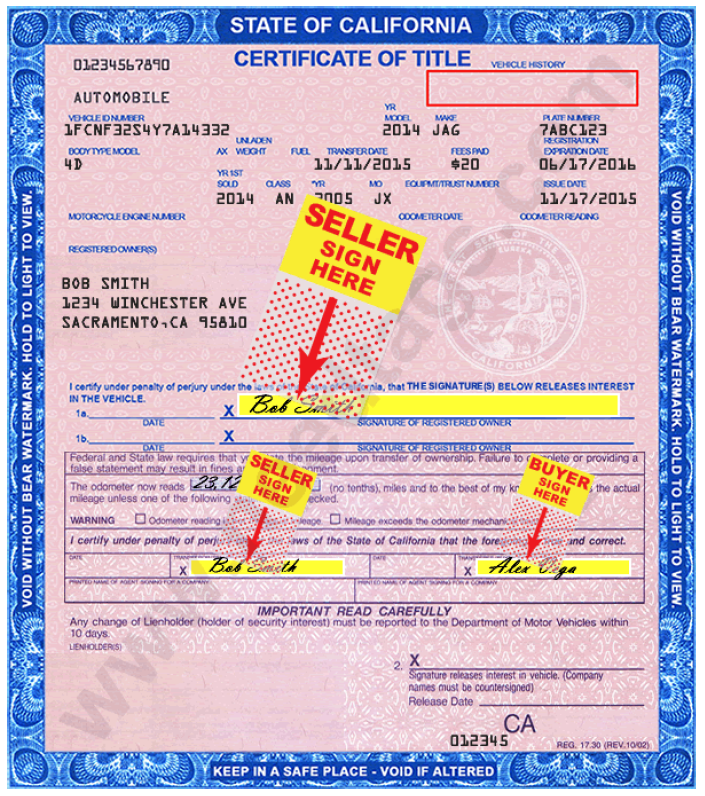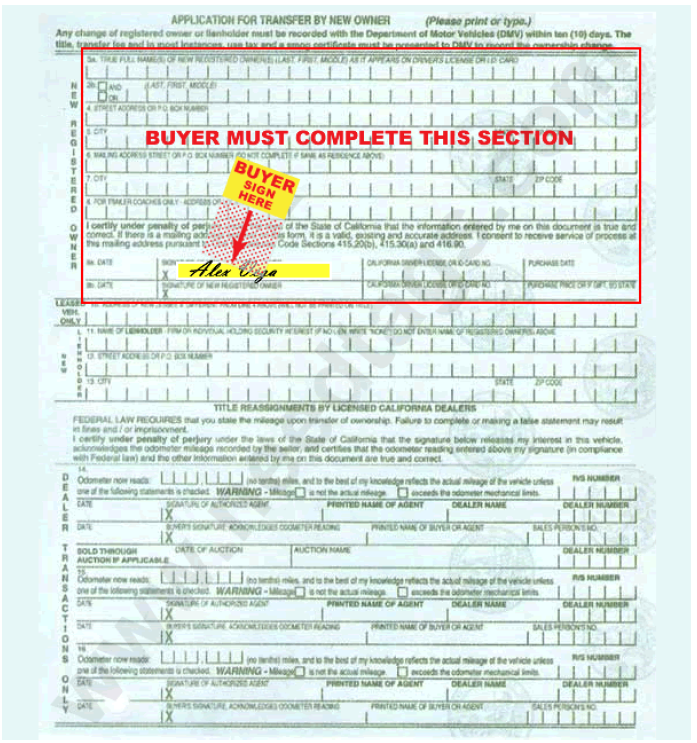Key Takeaways:
- All car owners must have a title in California to legally own the car
- You have ten days to legally transfer the title without paying penalty fees
- Vehicle title and registration are different, and you must change both in a car transfer
- You may owe use tax when you take ownership of a vehicle from a private owner
- If you don’t have the original title, you must apply for a replacement title first
If you own a car, you should have a car title. This document shows vehicle ownership and who has the right to legally transfer a vehicle. It also includes information about the vehicle, such as the Vehicle Identification Number (VIN) and type of vehicle. You receive the car title when you purchase a car with cash, pay off a car loan, or receive a car through inheritance or a gift.
Understanding Vehicle Titles and Registration
If you have a loan on the vehicle, the lender retains the title until you satisfy the loan agreement. While the loan is outstanding, the lender is named a lien holder on the title. If you transfer a title before the lender is removed from the title, you must provide proof of lien release before you can do a title transfer.
The vehicle title is not the same as vehicle registration. It’s important to clarify that most states, including California, require that you register a vehicle annually. A registration sticker shows you can legally drive the vehicle on your state’s roads. You must renew your registration annually and pay the appropriate registration fees. On the other hand, titles do not need to be renewed as long as you remain the owner.
However, as the owner, you will do a title transfer when you sell the car, gift it to someone, or leave it as an inheritance. Every state has different rules regarding transferring vehicle ownership, including the timeframe for the title transfer to avoid penalties.
Here’s how to transfer a car title in California.
Required Documentation To Transfer a Car Title
To transfer a car title in California, you’ll need the following documents:
- The original title
- Seller and buyer signatures on the title
- All applicable fees
How to Transfer Car Title in California in a Private Sale
A private sale occurs when you sell your car to another buyer without a company acting as the intermediary. You may advertise the car for sale in a marketplace or word-of-mouth. The transaction doesn’t take place at a dealership.
The title transfer process for a private sale follows these steps:
- The seller signs the vehicle’s title to release ownership and discloses the mileage.
- The seller must complete an Application for Replacement or Transfer of Title if they don’t have the title.
- Within five days, the seller must complete the Notice of Transfer and Release of Liability.
- The seller must have a lienholder’s release if there is an outstanding loan (notarized if applicable).
- The buyer brings the title to the local DMV office to apply to transfer ownership.
- The buyer must get a smog inspection in most cases.


How to Transfer Car Title in California Between Family Members
If you’re gifting a vehicle to a family member or leaving it as an inheritance, you must transfer the vehicle title upon transfer. This shows the legal owner and removes any liability from your shoulders once you no longer own the vehicle.
To transfer vehicle ownership to a family member, do the following:
- Sign the California Certificate of Title on line 1.
- Enter the information of the recipient on the back.
- Sign the back of the title to transfer ownership.
- Complete the Statement of Facts for exemptions.
- Complete the Odometer Disclosure to disclose mileage.
How to Transfer Car Title in California From a Deceased Owner
If someone left you with a car as an inheritance after passing away, you must prove you are the new legal owner by doing a California title transfer.
To transfer a California title from deceased owners, do the following:
- The designated heir must sign the title with the deceased owner’s name
- The heir must also countersign on line 1 of the title
- Complete and sign an Affidavit for Transfer without Probate
- Provide an original, certified copy of the Death Certificate
- Complete the odometer disclosure
What are the Fees to Transfer a Car Title in California?
The fees you’ll owe to transfer vehicle ownership depend on the type of transfer. You may pay the following fees:
- Replacement title: If you lost the original title or it’s damaged, you must apply for and pay the $27 fee for a new title
- Use tax: The use tax is 7.25% – 10.25%, depending on where you live, and all private title transfers require payment of it.
- Registration fees: If the vehicle’s registration is due, you must pay the applicable fees, which vary based on the type of vehicle, transfer date, and where you live.
- Any applicable penalties: California does not have a grace period for registration fees, so you may owe penalties if you miss the date.
Who Pays the Title Transfer Fees?
In California, the buyer pays the title transfer fees when transferring a title. The Department of Motor Vehicles usually takes 30 days to process the transfer and mail the title to the new owner after you pay the applicable fees.
FAQ
Where Do I Sign on the California Certificate of Title?
If you are the seller, you must sign the title on line 1a, which says ‘Signature of Registered Owner.’ You must also complete the odometer reading and sign below it where it says ‘Transferor/Seller Signature.’ After the seller signs the title, the buyer must complete and sign the new owner information on the back of the title. The buyer must then take the signed title to the DMV office.
What is the Difference Between “or” and “and” on a Car Title?
If you own a vehicle with another person, the title will have either an “or” or “and” between the names. If there is an “or,” any person can sign the title to transfer it. However, if there is an “and” between names, both signatures are necessary for title transfer.
Can You Gift a Car to a Family Member in California?
You can gift a car to a family member in California, and unlike non-family transfers, the person receiving the vehicle doesn’t have to pay use tax. However, it only counts as a gift if you do not trade money or property for the gift. You also cannot take over someone’s loan payments for the car to be considered a gift.
What Happens if You Don’t Transfer a Title Within Ten Days in CA?
You will accrue late fee penalties if you don’t do a title transfer within ten days in California. The amount you pay depends on the number of days that pass.
Does the California DMV Require a Bill of Sale for Title Transfer?
California only requires a bill of sale in a private sale if the seller is not the person named on the title. In this case, you must have a bill of sale with both the seller and the title holder’s signatures. You must also include a record of the odometer reading.
Final Thoughts
It’s not hard to transfer a car title in California, but there are multiple steps you must follow. Because California does not allow a grace period, it’s crucial to quickly transfer the title to the new legal owner to avoid unnecessary fees.
When you are the car’s legal owner, you can use the vehicle as equity for loans, including a title loan, which is a short-term loan for financial emergencies. You use your car as collateral for a title loan. If you have a financial emergency and need funds fast, check out your eligibility for a title loan; there’s no obligation, and you’ll receive an answer instantly.

Written by
Samantha Hawrylack
Samantha Hawrylack writes for our company and is an expert in personal finance. Sam received her Bachelors of Science in Finance and her Masters in Business Administration from West Chester University of Pennsylvania. She began her career in the financial services industry and shifted to an entrepreneurial role where she could directly impact clients. Sam has an impressive background in personal finance and business management.
